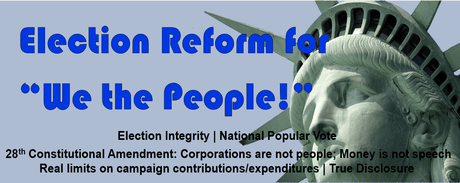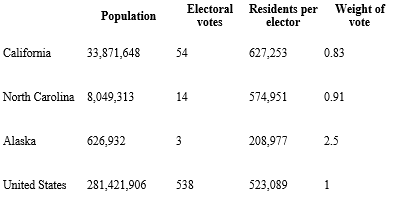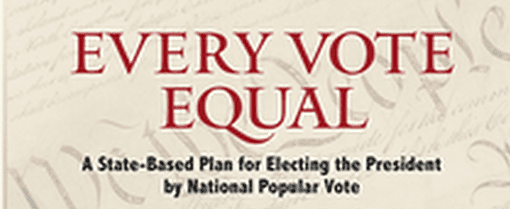MISSION:
|
|

Sen. Bernie Sanders and Donald Trump both declared during the 2016 election that the system is rigged. But their ideas of what constitutes rigging are different. We agree with Bernie's concerns about the system, so we are paying attention to election integrity (fraudulent electronic vote counting), gerrymandering, voter suppression, attacks on the Voting Rights Act, Supreme Court decisions that reduce or eliminate limits on campaign contributions/expenditures, "dark money" and the influence of the electoral college.
Election Reform Home Page | Electoral College and the National Popular Vote | Election Integrity | Gerrymandering
Limiting campaign contributions/expenditures | Right to Vote and the Voting Rights Act | Voter Suppression
28th Constitutional Amendment - money not speech/corporations not people
Limiting campaign contributions/expenditures | Right to Vote and the Voting Rights Act | Voter Suppression
28th Constitutional Amendment - money not speech/corporations not people
Electoral College and the National Popular Vote
"This action will help ensure every vote is treated equally and places New York at the forefront of the battle for fairer elections and strengthen our democracy," Governor Cuomo said. "Making the national popular vote a binding one will enable all voices to be heard and encourage candidates to appeal to voters in all states." |
Hillary Clinton wins the popular presidential vote by close to 2.9 million votes. Yet Donald Trump is the new president. For the sixth time in America's history, the losing candidate has been awarded the presidency due to the Electoral College. And two of those times are now in the current century. These presidents were all winners in the Electoral College, and therefore became the President, even though the pepole's vote was against them: Thomas Jefferson, John Quincy Adams, Rutherford B. Hayes, Benjamin Harrison, George W. Bush and now Donald Trump
Unacceptable in a nation which believes in One Person, One Vote and majority rule.
The American Electoral College (EC) grants each state one vote in the EC for each of the state's representatives and senators. So a low population state like Maine has three votes while a high population state like California gets 55 votes. But proportionally those EC votes have different values. Here are some figures from the 2000 election illustrating this:
Unacceptable in a nation which believes in One Person, One Vote and majority rule.
The American Electoral College (EC) grants each state one vote in the EC for each of the state's representatives and senators. So a low population state like Maine has three votes while a high population state like California gets 55 votes. But proportionally those EC votes have different values. Here are some figures from the 2000 election illustrating this:
|
So, the individual California voter's vote counts for less than a full vote while the individual Alaska voter's vote counts for 2.5. This means that the California voter has less weight in the final selection of the president. If the system counted all votes equally, then both the California and Alaska values would be the same, 1.
So the EC system gives more value or weight to the small state voter vs the large state voter. Because of that and the fact that all but a few states grant all their EC votes on a winner-take-all basis, we have the situation where candidates not winning the majority of the vote are elected president. |
|
Change the system to reflect majority rule and one person/one vote The only method explicitly provided by the Constitution for fixing the problem is to abolish the Electoral College by amending the constitution. This is very a long and uncertain process requiring the approval by 2/3 of both houses of Congress, followed by 3/4 of state legislatures or to convene a Constitutional Convention.
But there is another way: States can simply agree to a Compact (agreement), which are authorized in the Constitution, among themselves to work around the Electoral College. This is called the National Popular Vote. What is the National Popular Vote (NPV)? NPV is an agreement between states Each participating states pledges by state law to instruct their Electoral College delegates to vote for the candidate with the largest number of popular votes nationally. In other words, they pledge their electors to respect the national popular vote, instead of just the vote within their own state as is now the case. This pledge goes into effect as soon as enough states have adopted it to command a majority in the Electoral College. This simple action by a sufficient number of state legislatures will ensure that never again will the United States have a president who lost the vote of the American people. To date, 11 states have approved NPV, representing 165 Electoral College votes (CA, DC, HI, IL, MA, MD, NJ, NY, RI, VT, WA). It will go into effect with the approval of states representing 105 more electoral votes. |
In Oregon
GOOD NEWS in Oregon! The 2019 Oregon Legislature passed National Popular Vote. It has been enacted into law in 16 jurisdictions with 196 electoral votes (CA, CO, CT, DC, DE, HI, IL, MA, MD, NJ, NM, NY, OR, RI, VT, WA). The bill will go into effect when enacted by states with an additional 74 electoral votes. More details of the Oregon passage here. During each of the past three legislative sessions, bills have been introduced in both the House and Senate to enact the National Popular Vote compact. Each session ended with the House approving and the Senate not voting. We are told that the lack of action in the senate to due to the opposition of Senate President Peter Courtney.
ACTION NEEDED LET THE SENATE VOTE Contact Sen. Courtney and tell him that you want the Senate to vote on the National Popular Vote legislation during the 2017 session. During the 2015 session, a majority of the senators actually were co-sponsors. In spite of that, the Senate was not allowed to vote. Now for the 2017 session, Senator Michael Dembrow and Representative Alissa Keny-Guyer have promised to reintroduce it. CONTACT YOUR OREGON STATE REPRESENTATIVE AND SENATOR
Not Sure Who Represents You? Find your legislators here. Bill introduced to eliminate Electoral College with constitutional amendment HJR19 - Proposing an amendment to the Constitution of the United States to abolish the electoral college and to provide for the direct election of the President and Vice President of the United States. Introduced 1/5/17 by Rep. Cohen and Cooper. Text here. |
News stories and opinions
3/11/17 CA Proposed Initiative - Asks Voters Whether Elected California's Elected Officials Should Use Their Authority To Cause The President and Vice President Of The United States To Be Elected According To The Outcome Of The National Popular Vote. Sierra Sun Times
3/10/17 The Very Legitimacy of Our Democracy is Under Threat. The Nation
3/9/17 Oregon Should Join The National Popular Vote Compact? Pamplin Media
2/23/17 These 3 Counties Could Have Flipped the 2016 Election for Hillary Clinton Time Magazine
2/7/17 Supreme Court Justice Ruth Bader Ginsberg supports elimination of Electoral College. AOL.news
1-25-17 Republicans move forward with plans to gerrymander the Electoral College in three states. by Stephen Wolf
1/27/16 Va. bills to change Electoral College vote distribution fail The Associated Press
1/31/17 Under a New System, Clinton could have won the Popular Vote by 5 Points and Still Lost by Harry Enten, FiveThirtyEight
3/10/17 The Very Legitimacy of Our Democracy is Under Threat. The Nation
3/9/17 Oregon Should Join The National Popular Vote Compact? Pamplin Media
2/23/17 These 3 Counties Could Have Flipped the 2016 Election for Hillary Clinton Time Magazine
2/7/17 Supreme Court Justice Ruth Bader Ginsberg supports elimination of Electoral College. AOL.news
1-25-17 Republicans move forward with plans to gerrymander the Electoral College in three states. by Stephen Wolf
1/27/16 Va. bills to change Electoral College vote distribution fail The Associated Press
1/31/17 Under a New System, Clinton could have won the Popular Vote by 5 Points and Still Lost by Harry Enten, FiveThirtyEight





